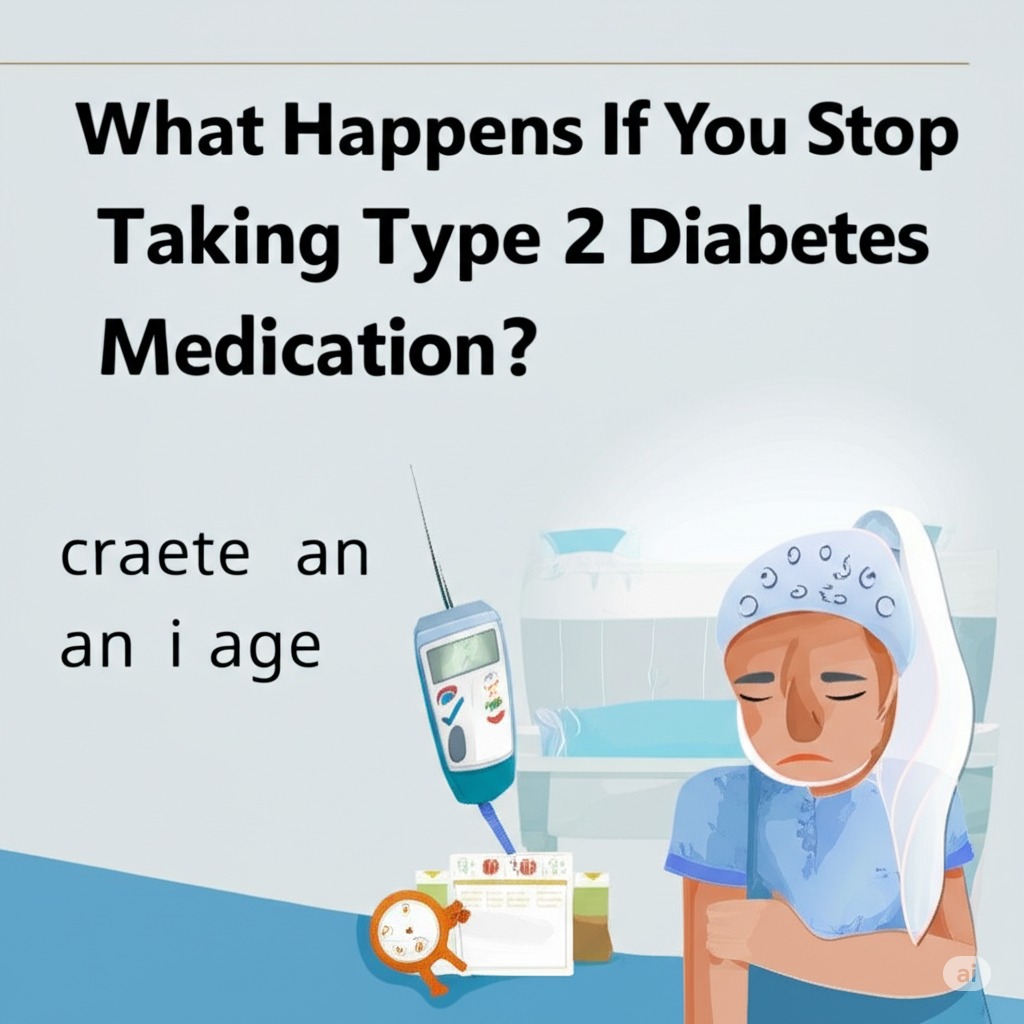Type 2 diabetes is a chronic condition that affects how your body processes sugar (glucose). For people living with this condition, medications are often prescribed to help control blood sugar levels. However, a common question that arises is, “What happens if you stop taking type 2 diabetes medication?”
Whether you’re considering stopping your medication, are curious about its effects, or simply want to understand the importance of sticking to your treatment plan, this article will provide clear and comprehensive information. We’ll explore the risks and consequences of stopping diabetes medication, why it’s important to stay on track, and how it can affect both your short- and long-term health.
What Is Type 2 Diabetes?
Before understanding the impact of stopping medication, it’s essential to know what type 2 diabetes is. Type 2 diabetes is a metabolic disorder where the body either becomes resistant to insulin or doesn’t produce enough insulin to maintain normal blood sugar levels. Insulin is a hormone that helps your cells use glucose for energy.
Over time, high blood sugar levels can lead to serious complications such as heart disease, kidney damage, nerve damage, and more. Managing type 2 diabetes typically involves lifestyle changes such as diet and exercise, along with medications that help control blood sugar levels.
Why Is Medication Important in Managing Type 2 Diabetes?
Medications for type 2 diabetes are designed to help your body manage blood glucose levels. There are various types of medication, including:
- Oral medications like metformin, which help reduce blood sugar levels by improving insulin sensitivity and reducing the amount of glucose produced by the liver.
- Injectable medications like GLP-1 receptor agonists or insulin, which may be used when oral medications are not enough to control blood sugar.
- SGLT-2 inhibitors and DPP-4 inhibitors, which work by helping the kidneys excrete excess sugar or by increasing insulin secretion.
These medications are often prescribed in combination with lifestyle changes to ensure that blood sugar remains under control.
What Happens If You Stop Taking Your Type 2 Diabetes Medication?
If you stop taking your diabetes medication, you risk serious health consequences. Let’s take a closer look at what can happen when you don’t follow your prescribed medication regimen:
1. Blood Sugar Levels Will Likely Rise
One of the most immediate effects of stopping your type 2 diabetes medication is a rise in blood sugar levels. Medications like metformin and insulin work to lower blood glucose by helping your body either use insulin more effectively or produce more insulin. Without the medication, your body’s ability to regulate blood sugar will be significantly impaired.
Elevated blood sugar levels, also known as hyperglycemia, can cause symptoms such as:
- Frequent urination
- Excessive thirst
- Fatigue
- Blurred vision
- Headaches
If left uncontrolled, high blood sugar can lead to more serious issues, including diabetic ketoacidosis (DKA), a life-threatening condition primarily associated with type 1 diabetes but can occur in type 2 if blood sugar levels stay too high for too long.
2. Increased Risk of Long-Term Complications
Long-term high blood sugar increases the risk of severe complications, many of which can be debilitating or even fatal. These include:
- Heart disease: Diabetes is a significant risk factor for cardiovascular diseases, including heart attacks, stroke, and hypertension (high blood pressure).
- Kidney damage (diabetic nephropathy): Uncontrolled blood sugar can damage the kidneys over time, leading to kidney failure if not managed.
- Nerve damage (diabetic neuropathy): High blood sugar can damage the nerves, leading to numbness, tingling, and pain, especially in the feet and hands.
- Retinopathy: Uncontrolled diabetes can lead to damage to the blood vessels in the eyes, which can result in blindness if left untreated.
Stopping diabetes medication accelerates the risk of these complications, making it critical to continue your treatment plan even if you feel well.
3. Risk of Developing Insulin Resistance
When you stop taking your medication, your body may become less sensitive to insulin. This leads to an increase in insulin resistance, a hallmark of type 2 diabetes. Over time, this will make it harder for your body to regulate blood sugar, further exacerbating the condition.
4. Increased Risk of Weight Gain
Some medications for type 2 diabetes help with weight management, either by improving insulin sensitivity or by reducing hunger. Stopping these medications can lead to weight gain, which in turn can make blood sugar levels more difficult to control. This cycle of weight gain and high blood sugar can lead to a worsening of type 2 diabetes symptoms.
5. Risk of Hypoglycemia (Low Blood Sugar) with Insulin Use
In some cases, if you stop taking oral medications but continue using insulin, you may experience hypoglycemia (low blood sugar), which can cause symptoms such as shaking, sweating, dizziness, confusion, and even loss of consciousness. This can be particularly dangerous, especially if you do not recognize the symptoms or have no plan in place to treat low blood sugar.
6. Fluctuating Energy Levels and Mood
When blood sugar is not properly regulated, you may experience mood swings, irritability, and fluctuations in energy levels. This can impact your daily life and mental well-being, making it harder to concentrate, stay active, and perform routine tasks.
What Should You Do If You’re Thinking of Stopping Your Type 2 Diabetes Medication?
If you’re considering stopping your type 2 diabetes medication, it’s crucial to consult with your healthcare provider first. Your doctor can provide guidance on how to safely adjust your treatment plan, and they may suggest alternatives or modifications to help you better manage your blood sugar.
1. Discuss Alternative Treatment Options
If you are struggling with the side effects of your current medication or are finding it difficult to manage, talk to your doctor. There are many different classes of medications, and your healthcare provider may be able to switch you to one that suits your needs better.
2. Focus on Lifestyle Changes
Medications for diabetes work best when paired with healthy lifestyle changes. Focus on:
- Eating a balanced diet rich in whole foods, lean proteins, healthy fats, and fiber.
- Exercising regularly to improve insulin sensitivity and help regulate blood sugar.
- Managing stress through relaxation techniques like yoga, meditation, or deep breathing exercises.
These changes can help improve blood sugar control and may reduce the need for medication.
3. Gradual Medication Adjustments
If your doctor feels that a reduction in medication is appropriate, they will likely recommend a gradual approach rather than stopping abruptly. This helps ensure that your blood sugar levels are monitored and that your body adjusts accordingly.
Frequently Asked Questions (FAQs) on What Happens If You Stop Taking Type 2 Diabetes Medication?
1. What happens if you stop taking metformin for type 2 diabetes?
If you stop taking metformin, your blood sugar levels will likely rise, leading to symptoms like fatigue, excessive thirst, and frequent urination. Stopping metformin can also increase the risk of long-term complications such as heart disease, kidney damage, and nerve damage.
2. Can stopping diabetes medication lead to a diabetic coma?
While stopping diabetes medication doesn’t directly cause a diabetic coma, it can lead to high blood sugar levels (hyperglycemia), which, if left untreated, may result in a dangerous condition called diabetic ketoacidosis (DKA). DKA is a serious complication that requires immediate medical attention and can lead to coma if not treated promptly.
3. Is it safe to stop taking diabetes medication if my blood sugar is normal?
If your blood sugar is consistently within a healthy range, you may wonder if stopping medication is an option. However, it’s important to never stop medication without consulting your doctor. Type 2 diabetes is a chronic condition, and blood sugar can fluctuate, even if it appears to be under control. Your doctor can help you determine if medication adjustments are necessary.
4. Can type 2 diabetes go away if I stop taking medication?
Type 2 diabetes does not go away, but it can be managed effectively with medication, lifestyle changes, and careful monitoring. Stopping medication without medical guidance will likely lead to worsening blood sugar control and an increased risk of complications.
5. How long does it take for blood sugar to rise after stopping diabetes medication?
The time it takes for blood sugar levels to rise after stopping medication can vary depending on the individual, their type of medication, and their overall health. Generally, you may start to notice changes in your blood sugar within a few days to weeks of stopping your medication.
In conclusion, stopping type 2 diabetes medication can have serious consequences. It can lead to uncontrolled blood sugar, increasing the risk of long-term complications such as heart disease, kidney failure, and nerve damage. Always consult your healthcare provider before making any changes to your medication regimen, and remember that a healthy lifestyle is an essential part of managing type 2 diabetes effectively. By working closely with your doctor and staying on track with your treatment plan, you can better manage your condition and improve your overall health.



